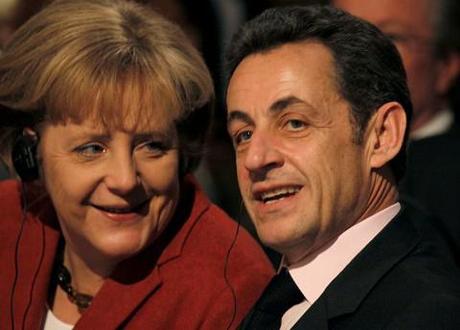
French President Nicolas Sarkozy and German Chancellor Angela Merkel. Photo credit: Sebastian Zwez
The German economy grew just 0.1 percent in the second quarter of 2011, according to provisional figures from the national statistics office, which were reported by the BBC. In the first quarter, the German economy grew at a more promising rate of 1.3 percent. German Chancellor Andrea Merkel and French President Nicolas Sarkozy meet today for crunch talks about the worsening debt crisis, which severely disrupted global markets last week. As the crisis mounts, major economies such as Italy and Spain, as well as so-called peripheral countries, are being urged by the European Central Bank to extend austerity measures to try to balance their budgets.
- European public deeply unimpressed by handling of the crisis. In a Bloomberg/YouGov pan-European poll of Eurozone members Germany and France and non-Eurozone members Britain and Denmark released today, the European public reported dissatisfaction with government action in the crisis and many expressed their desire to eject Greece from the Eurozone. Germans were particularly harsh on their government’s performance and gave low marks for the actions of the Merkel government (15% approved; 75% disapproved) and the information given about the crisis (19% approved; 75% disapproved).
- Germany riding out the storm, so far. Nicholas Kulish of The New York Times said Germany is “in the eye of the storm, with barely a hint of the winds swirling nearby. There is no tear gas, as in Athens; no tires burning, as in London; no chanting crowds packing public squares, as in Spain.” Kulish attributed the relative calm on the German street to the fact that the country has the third lowest rate of youth unemployment of any country in Europe (after the Netherlands and Austria). Only 9.1 percent of Germans between the ages of 15 and 24 are unemployed, less than half the 20.5 percent average in Europe. Kulish noted that, “Germany has already been down the bumpy road toward economic restructuring its European partners now find themselves on. Its competitiveness came at a cost. Under the government of Gerhard Schröder, Mrs. Merkel’s predecessor, large-scale protests broke out in response to difficult labor-market reforms, including making it easier to fire workers.” However, Kulish did forecast potential problems on the horizon for “inward-looking” Germany: “Still, for a country reliant on exports for growth, the possible slowdown in the global economy could have drastic and fairly sudden repercussions.”
- Sarkozy may be unpopular but France isn’t necessarily doomed. The Times’ (£) Europe Editor Charles Bremner focused on the hefty challenges facing Sarkozy: “Super Sarko has little room to move. French banks hold an uncomfortably large share of the debt of the embattled southern states; after weathering the recession relatively well, zero growth in the second quarter this year has heightened doubts about France’s ability to narrow its big public debt.” As Sarkozy prepares for next year’s presidential election, “no French leader for decades has faced such a daunting outlook,“ argued Bremner. But besides the president’s bleak plight, the writer suggested there are “solid reasons” for faith in French resilience. “Look at France’s assets. Unlike Britain, which banked on financial services and dumped much of its industry, France still makes things in a big way, from motor vehicles to nuclear engineering, high-speed trains, pharmaceuticals, airliners and space rockets … Wise long-term planning has equipped France with the best rail and road networks in Europe. Healthcare and other public services are excellent, as is the fabric of life — the towns, public spaces and buildings. This is drawing foreign companies increasingly to invest in France.”

